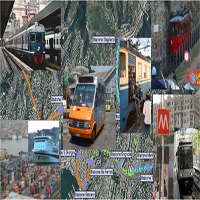Mobility participatory processes:Agenda21 and best practices
DOI:
https://doi.org/10.6092/1970-9870/507Keywords:
partecipation, mobility, soustaneability, Decision Support SystemAbstract
The prediction and realization of mobility actions, other than those already existing in a territory, often result in conflicts between the proponents (for example Administrations) and the population. Question not only of new road infrastructures but also new forms of mobility, such as best practice to make the sector sustainable. For example we can remember some tools of sustainable mobility, as Urban Traffic Plan or Urban Mobility Plan; the traffic calming measures, as areas with limited traffic, car sharing, car pooling; soft mobility as bike sharing; actions of local public transport as park and ride; communication and formative actions, as eco-driving courses and happybus (for children).
Certainly the construction of important infrastructures, strategic internationally, catalyze public attention because they pose problems to the entire community, but very often are the local works to determine conflicts. This paper focuses on this second aspect that is of major impact in our daily lives.
In order to achieve adequate sustainability thresholds for mobility and a general consensus shared at different involved levels, a fundamental role is played by "participation" that arises as a solution to the conflict aforementioned. Steps of the participatory process are information, awareness, communication and training.
A tool that allows you to achieve these objectives and facilitate the participatory process is the Agenda XXI, which, as noted, includes within it (after a survey on the environmental status and highlighting the present criticality studied by experts), consultation tables (forums) with the different actors involved (government, population, technical, business, ...).
In this paper we report the main results obtained in the search experience aimed at identifying best practices on sustainable mobility and its applicability thresholds useful to analyze and define, in a shared and co-responsible way, what are the good actions to take to an area considered. A best practice cannot be applied in different territorial areas, because the characteristics (cultural, physical or commercial development...) of each territory are various.
The research wants to categorize "the virtuous cases" to be able to define types of actions for replication in areas with similar characteristics.
From the above mentioned (reconnaissance and evaluative analysis on the case) it was possible to define two types of Decision Support System: the first, in general, defines a database of all possible best practices on sustainable mobility and the second is specific to a determinate territory (the latter is obtained by first, taking into account the identified applicability thresholds). This is to set the frameworks useful to administrators and people (involved in the first person) to be shared in the processes of Agenda XXI (forums) aimed at a participatory governance, without unnecessary conflicts.
Downloads
References
APAT (2000) Linee guida per le Agende 21 locali
APAT (2003) Dall'Agenda all'Azione: linee di indirizzo ed esperienze
Comune di Genova (2010) Piano Urbano della Mobilità Genovese, Documento finale
Comune di Savona (2010) Piano Urbano della Mobilità e del Traffico del Comune di Savona
ICLEI (1994) Guida Europea all’Agenda 21 locale
ISFORT (2005) Osservatorio sulle politiche per la mobilità sostenibile. Le politiche promosse in 10 città italiane
ISFORT (2006) Osservatorio sulle politiche per la mobilità sostenibile. Gli strumenti per la programmazione
ISFORT (2007) Osservatorio sulle politiche per la mobilità sostenibile. Gli strumenti dissuasivi della mobilità privata nelle città italiane
ISFORT (2007) Osservatorio sulle politiche per la mobilità sostenibile. Le iniziative promosse in 10 città italiane: aggiornamento dell’analisi al 2007
ISPRA (2009) Annuario dei dati Ambientali
Legambiente (2008), Ecosistema urbano
Pirlone F. (in corso di stampa) “Il Piano di Azione Locale come strumento di supporto per pianificare in modo sostenibile”, VI Giornata di Studi INU “Città senza petrolio”, 10 Giugno 2011, Napoli
Pirlone F., Spadaro I., Ugolini P. (in corso di stampa) “Le “buone pratiche” per rendere sostenibile la mobilità”, XVIII Conferenza Internazionale Vivere e Camminare in Città “Mobilità sostenibile e sicurezza stradale”, 16 e 17 giugno 2011, Brescia
Ugolini P. (2010) “Approccio alla sostenibilità nella governance del territorio”, Collana Città e Territorio, FrancoAngeli Editore, Milano
UNCED (1987) Rapporto Brundtland

Downloads
Additional Files
Published
How to Cite
Issue
Section
License
Authors who publish in this journal agree to the following:
1. Authors retain the rights to their work and give in to the journal the right of first publication of the work simultaneously licensed under a Creative Commons License - Attribution that allows others to share the work indicating the authorship and the initial publication in this journal.
2. Authors can adhere to other agreements of non-exclusive license for the distribution of the published version of the work (ex. To deposit it in an institutional repository or to publish it in a monography), provided to indicate that the document was first published in this journal.
3. Authors can distribute their work online (ex. In institutional repositories or in their website) prior to and during the submission process, as it can lead to productive exchanges and it can increase the quotations of the published work (See The Effect of Open Access)

